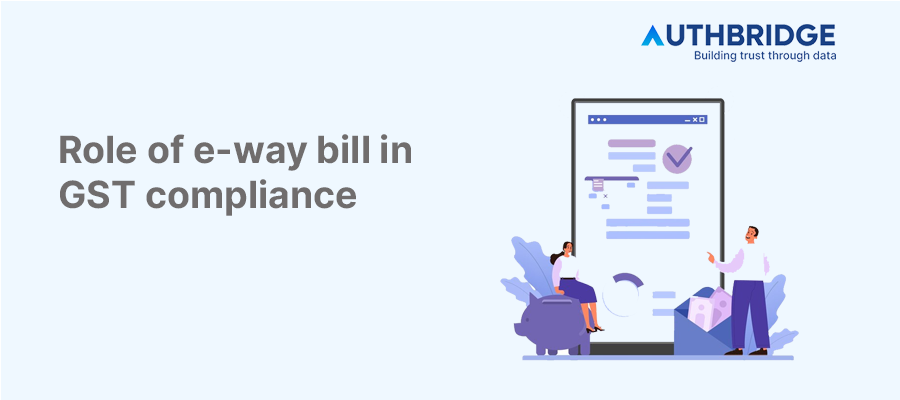Role Of E-Way Bill In GST Compliance: Enhancing Transparency And Streamlining Operations

Overview of E-Way Bill under GST
The Electronic Way (E-Way) Bill is a critical component of the Goods and Services Tax (GST) framework in India, introduced to track the movement of goods across the country. It serves as an electronic document generated on the GST portal, evidencing the movement of goods valued over INR 50,000. The e-way bill system aims to curb tax evasion and ensure that goods being transported comply with GST laws.
Legal Framework and Applicability
Mandated by the GST Council, the e-way bill system is governed by rules and regulations outlined in the GST Act. It applies to all registered businesses involved in the movement of goods, both interstate and intrastate, with specific exemptions provided for certain goods and transactions.
Importance of E-Way Bill in GST Compliance
Ensuring Transparency and Accountability
The e-way bill system enhances the transparency of goods movement, allowing tax authorities real-time visibility into the transportation of goods. This accountability mechanism helps in reducing tax evasion and ensures that businesses comply with tax laws.
Facilitating Seamless Interstate and Intrastate Movement
By standardizing the documentation for goods movement across state borders, the e-way bill simplifies the process, reducing transit delays and improving supply chain efficiency.
Generating an E-Way Bill
Prerequisites for Generation
Before generating an e-way bill, the supplier or transporter must be registered on the GST portal. The invoice/challan related to the consignment must be prepared, and the transporter ID, if applicable, should be available.
Step-by-Step Process
- Login to the GST Portal: Access the e-way bill system using your GSTIN and password.
- Generate New E-Way Bill: Navigate to the 'E-Way Bill' section and select 'Generate New'.
- Enter Details: Fill in the details of the consignment, including the transporter's information, and submit to generate the e-way bill.
Special Considerations for Different Types of Consignments
Special rules apply to certain types of goods movements, such as job work, handicrafts, and exempted goods, each with specific documentation and process requirements.
Compliance Requirements
Mandatory Information for E-Way Bill Generation
To generate an e-way bill, certain mandatory information must be provided by the consignor or the transporter. This ensures that all transported goods are accounted for and comply with GST regulations.
Table 1: Mandatory Information for E-Way Bill Generation
Information Required | Description |
GSTIN of Consignor and Consignee | GST registration numbers of both parties involved in the transaction. |
Invoice/Challan Number and Date | Details of the invoice or challan under which goods are being transported. |
HSN Code | Harmonized System of Nomenclature code for the goods. |
Transport Document Number | Details of the transport document (Transporter ID, Vehicle number, or Railway Receipt Number). |
Value of Goods | The total value of goods being transported. |
Reason for Transportation | Reason such as supply, export, job work, etc. |
Validity and Renewal
The validity of an e-way bill is crucial for ensuring that goods are transported within the stipulated time frame. The validity period is based on the distance the goods are to be moved.
Table 2: Validity Period of E-Way Bills
Distance | Validity Period |
Up to 100 km | 1 Day |
For every 100 km or part thereof | Additional 1 Day |
In case of delays or unforeseen circumstances, the transporter can apply for the extension of the e-way bill validity period before its expiry.
Consequences of Non-Compliance
Non-compliance with e-way bill requirements can lead to severe penalties, including fines and seizure of goods.
Table 3: Penalties for Non-Compliance
Violation | Penalty |
Transporting goods without an e-way bill | Fine equivalent to the tax evaded or INR 10,000, whichever is higher. |
Incorrect information in the e-way bill | A penalty of INR 10,000 or the amount of tax evaded, whichever is higher. |
Impact on Businesses
Operational Efficiency and Cost Implications
The implementation of the e-way bill system has significant implications for the operational efficiency and cost structure of businesses.
Table 4: Impact on Operational Efficiency and Costs
Impact | Description |
Reduced Transit Time | Faster movement of goods due to minimized checkpoints and paperwork. |
Increased Compliance Costs | Additional resources may be required to manage e-way bill generation and compliance. |
Technological Upgrades | Investment in compatible software and systems for e-way bill generation and integration. |
Compliance Challenges and Solutions
Businesses often face challenges in adapting to the e-way bill system, primarily due to the technological and procedural changes it entails.
Table 5: Compliance Challenges and Solutions
Challenge | Solution |
Understanding Legal Requirements | Regular training and updates on e-way bill regulations. |
Technological Integration | Investing in GST-compliant software that offers e-way bill generation and management. |
Record-Keeping | Implementing robust systems for maintaining records of all e-way bills and related documents. |
Technological Integration
Integration with GST and Transportation Systems
The e-way bill system is designed to seamlessly integrate with the GST portal and transportation management systems, facilitating easier compliance and operational efficiency.
Use of Technology for Compliance and Monitoring
Businesses and tax authorities are increasingly leveraging technology such as RFID and GPS tracking to enhance the monitoring of goods movement and ensure compliance with e-way bill regulations.
Future Developments and Policy Changes
The GST Council continually reviews and updates e-way bill rules to address practical challenges and streamline the process. Businesses must stay informed about these changes to ensure continued compliance and leverage any new provisions for operational efficiency.
Category

Abhinandan Banerjee
(Associate Manager - Marketing)
Abhinandan is a dynamic Product and Content Marketer, boasting over seven years of experience in crafting impactful marketing strategies across diverse environments. Known for his strategic insights, he propels digital growth and boosts brand visibility by transforming complex ideas into compelling content that inspires action.



